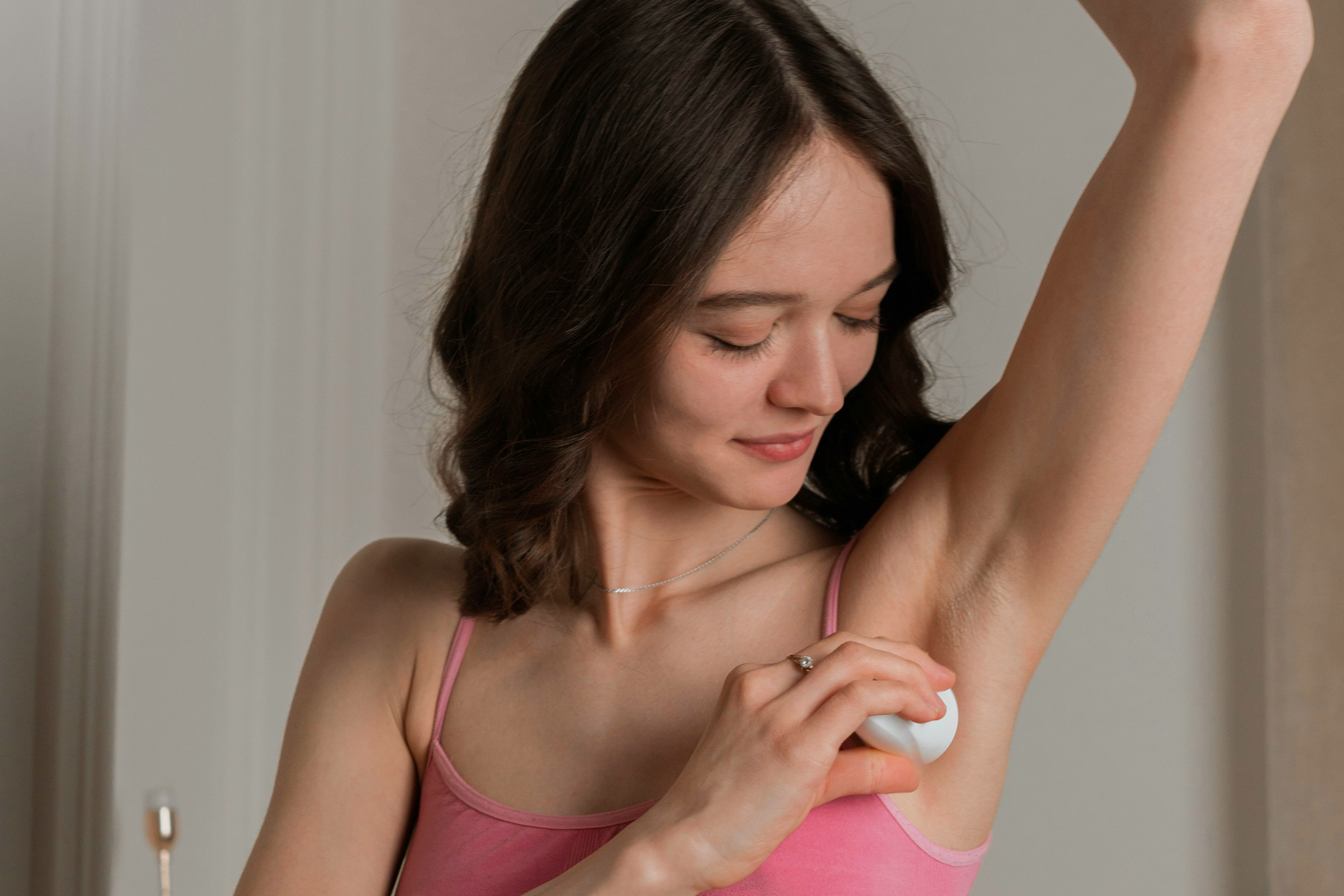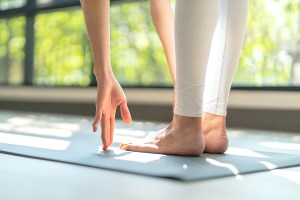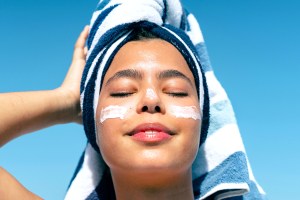We independently evaluate all recommended products and services. If you click on links we provide, we may receive compensation.
What’s not to love about summer? The sunshine, tomato season, beach shenanigans — and sweating so hard you wind up a little bit, uh, funky. Body odor is far from anyone’s favorite experience, but it’s something many of us deal with. This is especially true during the dog days of summer when the air is a swamp and our bodies are contributing to the general discomfort. But never fear: We’ve got your back. We consulted with a dermatologist to find out why sometimes we don’t smell that great, and what we can do to smell better, even on summer’s hottest nights.

What Exactly Is Body Odor?
Essentially, body odor is the smell that comes from the combination of sweat and the normal bacteria that live on our skin, together medically referred to as bromhidrosis. “The apocrine sweat glands located in the underarm and groin area produce sweat that is generally odorless,” New York-based board-certified dermatologist Dr. Marisa Garshick, M.D., FAAD, explains. “It is when the normal bacteria that live on our skin break down the sweat that odor may result, and what is generally responsible for what most people consider body odor.”
Sweating is a natural occurrence and happens for a multitude of reasons, including warm temperatures, stress, eating spicy foods, exercising, or as a side effect of certain medications. Additionally, some medical conditions can contribute to increased sweating and body odor, such as hyperhidrosis, thyroid problems, and hormonal issues. Dr. Garshick recommends treating these by addressing the underlying cause.

How Can You Best Manage Body Odor?
Making some lifestyle changes to reduce sweat and odor can help you avoid going to the doctor, unless you think you sweat excessively (called hyperhidrosis). As we’ve learned, sweat + bacteria = body odor, so it may be beneficial to take measures to avoid sweating as much as possible, because there’s not a whole lot you can do about bacteria (yet!)
1. Avoid Spicy Food
Bad news for anyone who loves spicy cuisine: Eating hot foods can increase your body temperature, which can lead to sweating as the body tries to cool down. Some spicy foods also contain capsaicin, which binds to receptors in our nervous system and then sends signals to the brain — which in turn interprets those signals as heat, and triggers the body to try to cool off by sweating. That said, life is boring without a little flavor, so if you love spicy food, eat it.
2. Avoid Certain Beverages
We love a glass of wine with dinner, or an iced coffee first thing in the morning, but alcohol and caffeinated beverages can lead to increased sweating. According to Dr. Garshick, alcohol causes vasodilation, or opening of the blood vessels, which can lead to warming and flushing of the body and can trigger the release of sweat. “Additionally, when the body metabolizes alcohol, it leads to a byproduct known as acetic acid showing up in your sweat, which can result in a distinct smell,” she explains. Caffeine, meanwhile, is a stimulant and acts on the central nervous system, which can increase heat production and, as a result, sweating.
3. Pay Attention to Clothing Fabric
Wearing tight clothing can trap heat and potentially increase sweating, and some synthetic fabrics, such as polyester and acrylic, can trap sweat and bacteria. Conversely, light, breathable fabrics, such as cotton, nylon, and rayon, may help reduce sweating. There are also sweat-wicking and odor-reducing fabrics — such as the merino wool in Uniqlo’s Extra Fine Merino Ribbed Mock Neck Sweater, or the spandex found in Athleta’s Elation V-Neck Hybrid Dress — that work to help absorb your sweat before bacteria can affect it, reducing the chance of body odor.
4. Try Odor-Reducing Body Products
After a workout, or any kind of event when you’re getting sweaty, take off your clothing and use a gentle body wash to thoroughly cleanse without stripping the skin of its natural oils. Dr. Garshick also recommends using a product containing salicylic acid, a beta hydroxy acid (BHA) full of exfoliating properties that can help with killing the bacteria that can cause body odor. You’ll find salicylic acid in products such as the Medik8 Press and Clear, Soft Services Clearing Mist, Saltair Seascape Deodorant, or Naturium Salicylic Acid Body Wash to help prevent breakouts and clogged pores, which can also occur with increased sweat.
Another ingredient that’s great for fighting bacteria is benzoyl peroxide, which, as a bacterial agent, works to literally kill off bacteria. Benzoyl peroxide, found in products such as SLMD BP Body Wash and Panoxyl 10% Benzoyl Peroxide Acne Foaming Wash, basically oxidizes bacteria on the surface of our skin by damaging the cell wall of the bacteria. When used consistently over time, it’s known to reduce the body odor-causing bacteria on the skin.

Should You Wear Deodorant or. Antiperspirant?
You’re probably wondering where deodorant fits into all of this, right? Well, before we get to that, it’s important to make sure that we know the difference between deodorant and antiperspirant. Essentially, deodorants reduce odor, while antiperspirants reduce sweat. “Antiperspirants, which are aluminum-containing and reduce sweat, differ from deodorants, which do not contain aluminum and do not reduce sweating, just reduce odor,” Dr. Garshick says. “Antiperspirants work by decreasing the amount of sweat released, thereby reducing wetness. Importantly, the only ingredients currently approved by the FDA to be included as an antiperspirant are aluminum-based.”
Aluminum-based products work by plugging up the sweat glands to directly block the release of sweat. Deodorants, on the other hand, do not eliminate the wetness itself, but instead target the “sweat smell” by trying to eliminate bacteria and providing a different scent to absorb any bad-smelling odors. Some products are just antiperspirants, like Dove Invisible Solid Antiperspirant and Certain Dri, and some are just deodorants, like Native Deodorant, Dove Whole Body Deo, and Secret Whole Body Deodorant. But there are also products that are a combination of both, such as Shea Moisture Raw Shea Butter & Hyaluronic Acid Moisturizing Antiperspirant Deodorant Stick.
Many natural products or products that are aluminum-free may work to mask odors, but they’re mainly considered deodorants because they don’t actually decrease the amount of sweat you produce. Some of the most commonly used ingredients in natural deodorants include baking soda, coconut oil, zinc oxide and mineral salts, magnesium, shea butter, tea tree oil, corn starch, lichens, witch hazel, aloe, and vegetable glycerin and tannic acid (typically found in tea).
Perhaps surprisingly, Dr. Garshick recommends using an antiperspirant at bedtime, rather than in the morning. “It is more effective to use an antiperspirant at night because the antiperspirant is designed to plug up the sweat glands, which is easiest to do at night when the sweat glands are not active or filled with sweat. The sweat ducts are then able to absorb more of the aluminum, and therefore be more effective,” she says. She also explains that it’s important to ensure the area is completely dry prior to application to minimize irritation. This is easier to do at night, too, but avoid applying the product right after a shower.
This article is for general informational purposes only.
Affiliate Disclaimer Medical Disclaimer
















 Unique Beauty is free for all users.
Unique Beauty is free for all users.